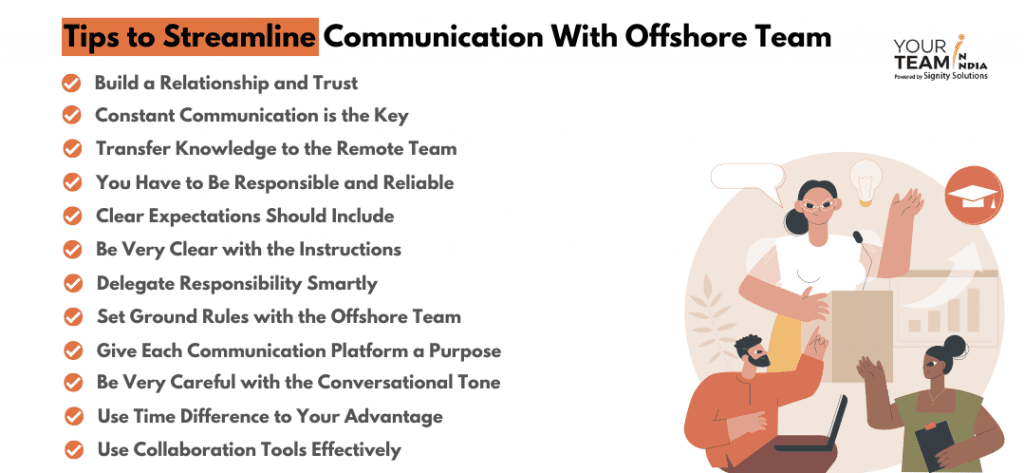Quick Summary: In today's global business landscape, offshore teams have become increasingly popular. However, effective communication can be a challenge when working with offshore teams. In this article, we have compiled 13 tips to help you streamline communication with offshore team. By implementing these tips, you can ensure that your offshore team is aligned with your goals and objectives, resulting in successful outcomes for your business.
According to Gallup, approximately 57% of US companies outsource IT services. There are plenty of reasons for it. When you hire developers, you receive a bunch of great benefits. This includes access to the talent pool of professionals across the globe, high scalability levels, reduced time, and access to the latest technological advancements.
You must have heard that ‘Communication is the lifeblood of organizations.’
This is true as effective communication is the foundation of just about everything. But remote management poses a challenge in terms of communication. You have to be very careful about how to avoid misunderstandings, and unmet expectations and cooperate with the offshore software development team.
Let’s find out, how to effectively streamline communication!
Recommended Read: Complete Guide on How to Hire Offshore Developers
13 Tips On How To Communicate With Offshore Team

1. Build a Relationship and Trust
Proper communication with your offshore development company is important for fruitful cooperation. Always remember that your remote team is the extended version of your in-house team. Don’t act like clients who simply want projects and tasks to be done.
Always remember that your remote team is equally important as your in-house team.
Not only they are your dedicated workforce, but also they ones that can help you digitally transform your business. Therefore, you have to keep them motivated so that they can perform well.
In case you opt for building your offshore development center, make sure to involve your remote team in every aspect of your project. Communicate your ideas, share your vision, and ask them for suggestions to bring everyone closer.
Take out time to know them personally and make them feel appreciated for the work they have done. Also, regular meetings with the Scrum framework will help you a lot in tackling communication issues.
2. Constant Communication is the Key
You should pay equal attention to communication issues and don’t ignore them. To start with, the project idea and requirements must be very clear from the beginning. However, it is important not to stop communication and keep checking how everything is going.
Constant communication with both teams helps you stay updated about what is already done. Whether there are any challenges, questions, issues or everything is falling in place as per the plan.
Stay transparent about your goals, share ideas and expectations, communicate your strategy, and collaborate systematically to get the desired result. There are numerous tools available online to track performance and communicate effectively.
The combination of synchronized and asynchronous options ensures that the team members have different ways to stay in touch regardless of the communication tools.
3. Transfer Knowledge to the Remote Team
Unshared knowledge always has a negative impact on the productivity of the team. Ensure that your in-house and offshore developers are on the same page regarding processes, workflows, and tasks.
The project details can be accessed with the help of technical documentation, spreadsheets, how-to guides, presentations, and more. Make it a point that your in-house team is always available to support your offshore development team.
There are plenty of coding practices, so it is important to know whether your and your developer’s vision of what has to be done is the same or not. Clarify all the aspects like a comment on the code, what data structure they are accustomed etc. This step will certainly help you avoid miscommunication from the start.
In order to avoid reinventing the wheel and copying others' work, both teams have to exchange some well-established practices not only with documentation but also with Q&A sessions, video seminars, live training, one-on-one meetings, technical discussions, etc.
This is a good way to ensure that all the employees (in-house & remote) have access to the information they require to do their job to perfection without wasting any time.
Unlock your software potential with our experienced team of developers!
4. You Have to Be Responsible and Reliable
When the lead or manager sets an example by being available whenever your team needs help, it creates a trust culture. Many remote development teams find it helpful to:
Use Schedule Sharing Tools: This is something just for the teams that are spread at different geographical locations. It makes it easy for the managers and teammates to keep in touch and stay updated with the availability.
Commit to Regular Contact: Regardless of daily or semi-weekly check-ins, sharing status updates, or collaborating within a project management platform, communication with the help of report drives displays accountability.
5. Clear Expectations Should Include
- Weekly tasks
- Where to find the task?
- Project ownership
- The support structure of the company regarding issues and problem-solving
- Weekly work commitment
Right contact information inclusive of emails, Skype, phone number, and company message.
6. Be Very Clear with the Instructions
When you have understood that communication is the primary key, sharing your vision has a strong impact on the project. Do you know where most companies go wrong? They start overloading their offshore developers with too much extraneous information in order to keep them engaged.
Sharing the business objective with the dedicated offshore developers you hire is very important so is keeping your message focused. Too much detailing gives a negative impact. Make sure you keep the message clear, speak to your remote team and access how they will be helpful in executing the vision.
Remember that your offshore development team is located in a different location. Keep them motivated and engaged by speaking their language and communicating how their input impacts your business.
It doesn’t matter whether your team sits in your office or operates from thousands of miles away. When a team is dedicated to working on your project, it is explicitly your team. It is your responsibility to appreciate and provide them with constructive feedback.
This will surely change their experience from feeling like a task rabbit to feeling that their work has a direct impact on business success. Moreover, it will increase the dedication and productivity level of your offshore development team.
7. Delegate Responsibility Smartly
Do you realize the fact that every developer you hire has a different skill set and level of expertise?
Many times you assign a more experienced person to serve as a dedicated Project Manager. Then this person stays on top of the project timeline and is responsible for absorbing all the information per the rollout schedule.
Having a good communication line with the Project Manager can help you make the right management decision as per the changes and fluctuations that affect your business.
Assign the responsibility to a project manager that has the ability to absorb more business-related details regularly. They should also know how to make adjustments to the team’s output accordingly. Once in a while, keep sharing the big picture with the entire team.
8. Set Ground Rules with the Offshore Team
Following simple rules make a lot of difference. For example, if addressing is very formal, emailing is done, and if there is something personal-Skype/Slack is used. Set a fixed time for meetings.
Decide the communication channel that is suitable to all employees whether in-house or remote. Whether you want to hire a front-end developer or back-end developer, never consider the distance an obstacle.
9. Give Each Communication Platform a Purpose
It becomes overwhelming to keep up with email, Slack, Skype, and a few other platforms to communicate on a daily basis. If there are multiple communication platforms, they may end up as a distraction.
The best you can do is to assign a separate task to each platform and streamline the process. For instance, keep Slack for project progress updates, emails for communicating with clients & Skype only for meetings.
Regardless of how you delegate responsibilities to different channels, it is important that you make everything clear to your offshore developers.
10. Be Very Careful with the Conversational Tone
When you are communicating with your offshore developers, it is usually via text. What you send may sound strictly informational and the other person may read the same way. This can be avoided to the same degree by clearly stating things, avoiding sarcasm, and occasionally using emojis.
Choose video and audio calls whenever possible, it's simply because it can help you read the expressions of the other person & communicate accordingly.
Hearing and watching one another helps to boost productivity. The mode of communication is more authentic and helps you to know your team better. Different small details help you build the type of relationship that you would like to have if you are working side by side.
11. Use Time Difference to Your Advantage
There are times when your dedicated offshore developers and the in-house team know how to communicate but have no idea about when to communicate. The time difference poses stern challenges but there are many ways to overcome them.
What you have to do is to find overlaps in the schedule with your offshore development team and then plan the work accordingly.
12. Use Collaboration Tools Effectively
Tools like Jira and Trello are used for issue tracking and managing the project. Jira is good for larger development projects and was designed for an Agile framework. On the other hand, Trello has a broader usage even outside the IT industry.
When it comes to messaging, you can take the help of Slack and Skype. Both are used for different business sizes but have their peculiarities. Slack has features like chat, file transfer, comment, and more. Skype has a file management function. You have to decide what works better for you.
Recommended Read: 5 Best Tools that Can Help You Manage Your Remote Team
13. Adopt Your Remote Team Completely
You should take communication one step further by getting to know the members of your remote team on a personal level. One success factor that separates established projects from the rest is how well clients integrate with the remote team. Effective collaboration with a dedicated development team consists of the following:
- Making an effort to know the members of the remote team
- Communicating the company’s vision so that they feel as part of something larger.
Know your offshore team, their backgrounds, hobbies, interests & habits, as you know everything about your in-house team. This is certainly going to help in the long run.
Always keep the offshore team in the loop when it comes to internal communication regarding the growth of the company. At the end of the day, remote teams are always looking to connect with the company’s vision, regardless of where they are located.
Manage the relationship with your offshore developers and your company’s management team. This business relationship will be a lasting partnership. Give positive feedback and then position yourself as a partner instead of a strategic client.
Summing Up
Your company’s success depends on how efficiently you build relationships and communication with the in-house and remote developers. You can either create a healthy environment or make it full of stress, the choice is completely yours.
Keep in mind, you have to stick to certain rules regarding the communication process. Take the help of convenient channels of messaging. Both teams should listen to and respect each other. They have to keep in mind that they pursue a common goal-delivery of a good result.
Creating great products is a journey. Working with a dedicated offshore development team that is overseas offers a long list of opportunities. It works best when there is effective communication, transparency, a strong foundation of trust, and mutual understanding.
Frequently Asked Questions (FAQs)
What is an offshore team?
What are some common communication challenges when working with offshore teams?
What are some effective communication tools for working with offshore teams?
How can you ensure that your offshore team is aligned with your business goals?
How do you motivate an offshore team?








